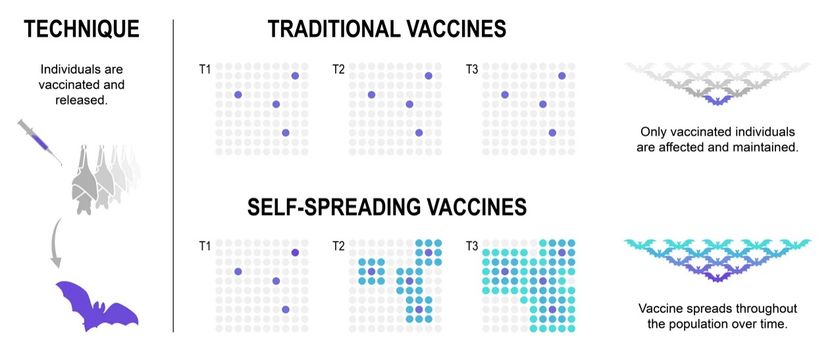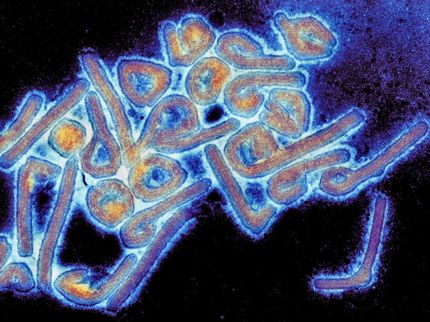Animal vaccines with self-spreading viruses
Vaccines for animals based on viruses that spread on their own are being developed in Europe and the U.S
Advertisement
Since the first lab-modified virus capable of replication was generated in 1974, an evidence-based consensus has emerged that many changes introduced into viral genomes are likely to prove unstable if released into the environment. On this basis, many virologists would question the release of genetically modified viruses that retain the capacity to spread between individual vertebrate hosts. Researchers from Germany, South Africa, the United Kingdom and the United States now point out in a policy piece that despite these concerns, self-spreading vaccines for animals are being researched in Europe and the US. They are intended to limit the spread of animal diseases or disease spillover to humans.

How a self-spreading vaccine could work in a bat population. Bats directly injected with a self-spreading vaccine passively spread the lab-modified viral vaccine to other bats they encounter over time (T1->T2->T3…) gradually building up population-wide immunity. In this example bats are used, but any mammal species that lives in groups could theoretically be targeted to rapidly vaccinate whole populations.
© Derek Caetano-Anolles
Non-spreading lab-modified viral vaccines are already in use today, for example as vaccines for wild animals against rabies or for humans against polio. However, in all modified virus applications to date, rigorous efforts have been made to eliminate (or, if this is not possible, minimize) the capacity of viruses to spread in the environment between host individuals.
The molecular tools necessary to generate viral vaccines that retain their capacity to be self-spreading have existed for some time. In 2000, researchers demonstrated the transmission of a self-spreading rabbit vaccine in a field trial on a Spanish island. However, the European Medicines Agency declined to grant marketing approval for the vaccine. "No new technologies are needed to produce self-spreading vaccines; they can be developed using methods that already exist today," says Filippa Lentzos of King's College London.
Viral vaccine against swine fever
In Spain scientists are currently vaccinating pigs with self-spreading viruses (that have not been modified in a laboratory) against African swine fever as part of contained experiments. In the U.S., a four-year research project has just ended that sought to mathematically identify strategies for deploying self-spreading vaccines. The U.S. Department of Defense's research agency, DARPA, is also funding experimentation to determine if lab-modified self-spreading animal vaccines can prevent the spillover of pathogens to U.S. military personnel in areas where they operate.
“If, as is argued, self-spreading vaccines are potentially transformational in a wide array of agricultural, medical and conservation uses, then developers and funders should commit to address needs within their own borders, rather than continue to propose equatorial nations for field testing.” says Guy Reeves of the Max Planck Institute for Evolutionary Biology in Plön, Germany. “This will maximise the chances of a robust debate among fellow citizens and nations about the wisdom of self-spreading viral approaches in the environment. In this respect the EU funded project to address a serious pig disease within its own territories could be viewed as a step in this direction.”
Original publication
Filippa Lentzos, Edward P. Rybicki, Margret Engelhard, Pauline Paterson, Wayne Arthur Sandholtz, R. Guy Reeves; "Eroding norms over release of self-spreading viruses"; Science; 7 January, 2022



























































